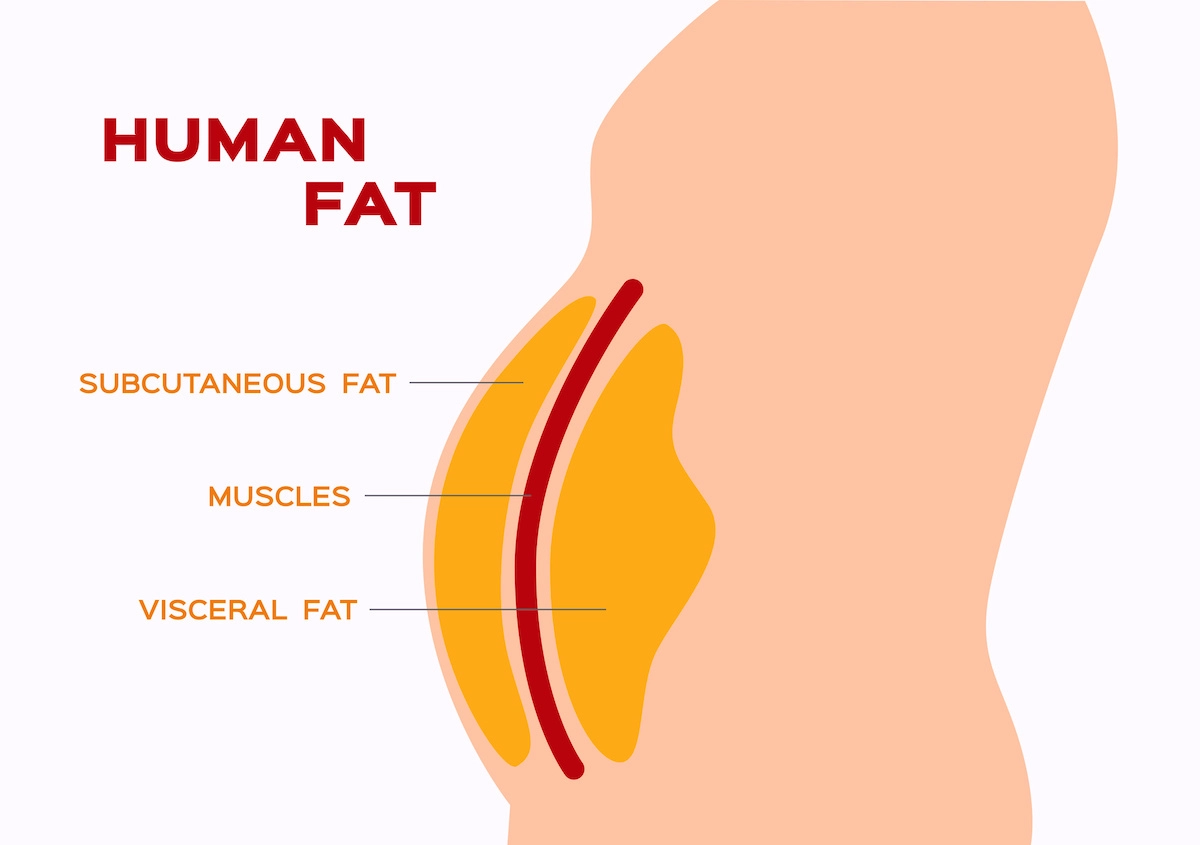
There are many reasons why people gain belly fat, including poor diet, lack of exercise, and stress. Improving nutrition, increasing activity, and making other lifestyle changes can help people lose belly fat.
Belly fat refers to fat around the abdomen. There are two types of belly fat:
• Visceral: This fat surrounds a person’s organs.
• Subcutaneous: This is fat that sits under the skin.
Health complications from visceral fat are more harmful than having subcutaneous fat. People can make many lifestyle and dietary changes to lose belly fat.
Why is belly fat dangerous? Being overweight is one of the leading causes of major diseases. Excess belly fat can increase the risk of heart disease, heart attacks, high blood pressure, stroke, type 2 diabetes, asthma, breast cancer, colon cancer and dementia.
Causes of belly fat: Common causes of excess belly fat include:
1. Poor diet– Sugary food such as cakes and candy, and drinks such as soda and fruit juice, can: cause weight gain, slow a person’s metabolism, reduce a person’s ability to burn fat.
Low-protein, high-carb diets may also affect weight. Protein helps a person feel fuller for longer, and people who do not include lean protein in their diet may eat more food overall.
Trans fats, in particular, can cause inflammation and may lead to obesity. Trans fats are in many foods, including fast food and baked goods like muffins and crackers.
The American Heart Association recommends that people replace trans fats with healthy whole-grain foods, monounsaturated fats, and polyunsaturated fats.
Reading food labels can help a person determine whether their food contains trans fats.
2. Too much alcohol– Consuming excess alcohol can cause a variety of health problems, including liver disease and inflammation.
A 2015 report on alcohol consumption and obesity found that drinking excess alcohol causes males to gain weight around their bellies, though study results in females are inconsistent.
3. Lack of exercise– If a person consumes more calories than they burn off, they will put on weight. An inactive lifestyle makes it hard for a person to get rid of excess fat, particularly around the abdomen.
4. Stress– A steroid hormone known as cortisol helps the body control and deal with stress. When a person is in a dangerous or high-pressure situation, their body releases cortisol, and this can impact their metabolism.
People often reach for food for comfort when they feel stressed. Cortisol causes those excess calories to remain around the belly and other areas of the body for later use.
5. Genetics– There is some evidence that a person’s genes can play a part in whether they become obese. Scientists think genes can influence behavior, metabolism, and the risk of developing obesity-related diseases.Environmental factors and behavior also play a role in the likelihood of people becoming obese.
6. Poor sleep– A 2013 study links weight gain to short sleep duration, which could lead to an excess of belly fat. However, causality cannot be inferred from this study.
Short duration of sleep is linked to an increase in food intake, which may play a part in the development of abdominal fat.
Not getting enough good sleep also may, potentially, lead to unhealthy eating behaviors, such as emotional eating.
7. Smoking– Researchers may not consider smoking to be a direct cause of belly fat, but they do believe it to be a risk factor.
A 2012 study published in the journal PloS one showed that, although obesity was the same between smokers and nonsmokers, smokers had more belly and visceral fat than nonsmokers.
How to lose belly fat
The following steps may help people lose unwanted belly fat:
1. Improving their diet. A healthy, balanced diet can help a person lose weight, and is also likely to have a positive effect on their overall health. People may want to avoid sugar, fatty foods, and refined carbohydrates that have low nutritional content. Instead, they can eat plenty of fruit and vegetables, lean proteins, and complex carbohydrates.
2. Reducing alcohol consumption. A person trying to lose excess abdominal fat can monitor their alcohol intake. Alcoholic drinks often contain additional sugar, which can contribute to weight gain.
3. Increasing exercise. A sedentary lifestyle can lead to many serious health problems, including weight gain. People trying to lose weight should include a good amount of exercise in their daily routine. Undertaking both aerobic exercise and strength training can help people tackle their belly fat.
4. Getting more sunlight. A 2016 review indicates that exposure to sunlight in animals could lead to a reduction in weight gain and metabolic dysfunction. The review notes that few studies have looked at the effects of sunlight on humans with respect to weight gain, and that more research is required.
5. Reducing stress. Stress can cause a person to gain weight. The release of the stress hormone cortisol influences a person’s appetite and could cause them to eat more. Stress-relieving tactics include mindfulness and meditation, and gentle exercise like yoga.
6. Improving sleep patterns. Sleep is vital to people’s overall health. Sleep’s primary purpose is to allow the body to rest, heal, and recover, but it can also affect a person’s weight. Getting enough quality sleep is essential when a person is trying to shed weight, including belly fat.
7. Quitting smoking. Smoking is a risk factor for increased belly fat, as well as many other serious health concerns. Quitting can significantly reduce the risk from excess belly fat, as well as improve overall health.
In summary: A person has a higher risk of various health issues if they have excess belly fat. Causes include poor diet, lack of exercise, and short or low-quality sleep. A healthy diet and active lifestyle can help people lose excess belly fat and lower the risk of problems associated with it.
Source: https://www.medicalnewstoday.com/articles/323309
Reviewed by Daniel Bubnis, M.S., NASM-CPT, NASE Level II-CSS, Fitness—by Bethany Cadman—updated on February 9, 2023
Additional sources:
Abdominal obesity and your health. (2017); https://www.health.harvard.edu/staying-healthy/abdominal-obesity-and-your-health
Behavior, environment, and genetic factors all have a role in causing people to be overweight and obese. (2018); https://www.cdc.gov/genomics/resources/diseases/obesity/index.htm
Fats. (2021); https://www.heart.org/en/healthy-living/healthy-eating/eat-smart/fats










